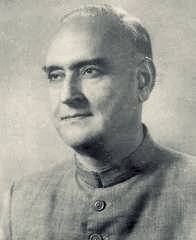Mahmud Husain
 Mahmud Husain Khan (5 July 1907 – 12 April 1975) was a Pakistani historian, educationist, and politician, known for his role in the Pakistan Movement, and for pioneering the study of social sciences. He served as Minister for Kashmir Affairs from 1951 to 1953 and Minister for Education in 1953, as well as minister of state in Pakistan's first cabinet under Prime Minister Liaquat Ali Khan.
Mahmud Husain Khan (5 July 1907 – 12 April 1975) was a Pakistani historian, educationist, and politician, known for his role in the Pakistan Movement, and for pioneering the study of social sciences. He served as Minister for Kashmir Affairs from 1951 to 1953 and Minister for Education in 1953, as well as minister of state in Pakistan's first cabinet under Prime Minister Liaquat Ali Khan.As a member of the country's first Constituent Assembly, Husain served on Muhammad Ali Jinnah's parliamentary committee for fundamental rights and minorities. After becoming federal minister under Prime Minister Khawaja Nazimuddin, he refused to rejoin the cabinet when Governor-General Ghulam Muhammad dismissed the Nazimuddin ministry. He played a key role in authoring the draft Constitution of 1954, but quit politics in protest when the assembly was dissolved before it was passed.
Returning to academia, Husain served as vice-chancellor of Dhaka University, resigning in 1963 when Ayub Khan's military dictatorship sought disciplinary action against student protestors. A proponent of greater rights for East Bengal and later East Pakistan, now Bangladesh, Husain emerged a vocal but unsuccessful critic of West Pakistan's policies towards its eastern wing.
He later served as vice-chancellor of University of Karachi until his death in 1975. He founded Jamia Milia Islamia, Malir, modelled on the university of the same name in India founded by his brother, Zakir Husain. University of Karachi renamed its library in his memory in 1976. Provided by Wikipedia
1
2